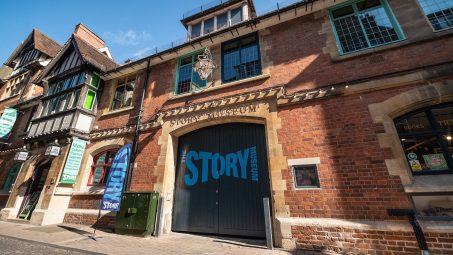
Work Experience Best-Practice Guide
Work experience is a placement offered by an employer on their premises, during which school or college students carry out tasks more or less as an employee would. The placement can last for a week or longer, and includes an emphasis on the learning aspects of the experience.
What is work experience
Work experience is a placement offered by an employer on their premises, during which school or college students carry out tasks more or less as an employee would. The placement can last for a week or longer, and includes an emphasis on the learning aspects of the experience. The ‘hands-on’ nature of work experience placements makes them distinct from ‘work shadowing’, in which students passively observe individual employees going about their normal activities, but are not assigned their own tasks.
Why is work experience important?
The most important reason to offer work experience is to help pupils to make informed decisions about possible future careers and work. However, businesses in Oxfordshire, in common with the rest of the UK, report a significant skills gap and difficulty filling posts. With an ageing population, this problem is set to worsen if the young people who form the future workforce are not equipped with workplace skills. Giving young people experience that will inspire them to develop these practical skills is therefore also hugely important for the longterm wellbeing of your business.
What is more, we know that there are huge disparities in Oxfordshire between children who start life with good opportunities, and those who are deprived when it comes to education, skills and training. Accessing professional work experience can be a gateway to a better future for young people who do not have many choices, introducing them to networks and helping them to make more informed career choices about a wider range of industries than they might have considered before.
Types of work experience
Parental arranged
Parents can arrange work experience that is neither endorsed nor supported by a school/college – so the parents have sole duty of care for their child (of any age). There are no official guidelines for such placements, but employers must still adhere to employee health and safety laws.
Pre-16 block
The traditional and long-established model for work placements of which most people will be aware. The objective of this placement is to give young people aged 14–16 a taster of being in the workplace, a chance to see and develop the skills needed and to gain confidence in an unfamiliar environment, usually for one or two weeks.
Post-16 block
Many schools and colleges encourage students in sixth form (aged 16–18) to organise work experience for themselves. This will most likely be to further develop employability skills, and to enhance future applications for university, apprenticeships or employment. Most often this is for a week.
Students with special needs
A bespoke placement is arranged to suit the student’s individual needs (usually 14+). The duration and frequency of attendance will vary and may change over time as the student’s confidence increases. It may start with a teacher also in attendance.
As part of a qualification
Many qualifications require an element of work experience. Students will spend time with an employer to apply what they have already learned in theory in a real-life setting. Work experience is a key component of the 16 to 19 Study Programmes and Traineeship Programmes, and can vary in duration.
Paid work experience
Some companies offer comprehensive long-term work experience programmes, with a short paid component of a few weeks followed by mentoring and events over a period of months that could lead to a job or apprenticeship. One example of this is the EY Foundation’s Smart Futures programme, which targets state school pupils and includes work placements with around 70 companies.
Benefits to your business
Workforce planning – In many cases, a future apprentice or talented and loyal employee has been recruited following successful work experience, and employers can use the opportunity to influence young people’s training.
Brand promotion – Enhancing your business’s brand in the minds of parents, teachers and students is likely to lead to increased brand recognition, and loyalty.
Feel-good factor – It’s the right thing to do – especially helping those who might not have their own connections to organise work experience through their parents.
Fresh approaches – Young people often bring new ideas or skills that reflect the interests of the next generation of customers, and can help you appeal to emerging consumer groups and markets.
Sector promotion – Positive early introductions for young people can influence them to pursue a career in your industry and shape their subject and training choices, thus improving future employee quality.
Staff engagement and development – You can treat work experience as an opportunity for current staff to get behind a cause, and also to develop your existing staff by giving them management or mentoring experience.
Challenges
Many businesses are put off offering work experience because of the perceived challenges:
Lack of knowledge – When first offering work experience, it is difficult to know how to set it up, what level the student can work at or what activities to offer them.
Lack of time and resource – The process of putting together work experience is expected to be labour-intensive for the company, perhaps due to the anticipation of reams of paperwork.
However, most challenges can be overcome with good communication, an understanding of the process and what’s involved, and having realistic expectations.
Communication with a school through a direct contact for work experience can make everything much easier, as they can advise you on the process and tell you about the student. The process itself is relatively straightforward and shouldn’t involve a huge number of forms; even the health and safety element simply clarifies and confirms what you should have in place as a businessalready. Schools now understand that your everyday business operations must come first.
The hardest part is devising a programme and teaching the student key skills as part of it. A few simple steps outlined in this guide can help – for example, being clear about what you can offer and what students can do will ensure there is no disappointment on either side.
This handbook
The purpose of this handbook is to help you to minimise the challenges above and reap the rewards of well planned and executed work experience. It was developed with the input of Reciprocate members Blenheim Palace and Beard Construction, both of whom have extensive experience of offering rewarding, smooth-running work experience placements. Local business–education brokers O2i (Opportunities to Inspire) also provided much of the information.
Reciprocate’s ambition is to make quality work experience accessible to more students, especially those with disabilities and from more deprived circumstances. By publishing this best-practice advice, we hope to achieve a more consistent, high-quality experience for Oxfordshire’s young people, whatever their background.
STEP-BY-STEP GUIDE
to organising a work experience placement
GETTING SUPPORT: O2i
O2i (Opportunities to Inspire) supports links between the education and business worlds, encouraging
companies to inspire the next generation. If you are looking to offer work experience, they can advise
on any aspect of the process and connect you with colleagues at Oxfordshire Work Experience (OWE), who will put you in touch with students and schools. Contact info@O2i.org.
DECIDE TO OFFER WORK EXPERIENCE
- You may proactively decide you want to offer work experience.
- Be aware that you may also be contacted directly by students or parents.
WHAT TO DO IF YOU’RE APPROACHED
Schools and colleges across Oxfordshire work in slightly different ways: some may find placements for their students, others may ask students to find their own. You may be asked for a placement up to nine months in advance.
If you receive a direct approach from a student, their school or college should also contact you. They may ask you to complete a brief form at this stage, and you should expect to be given information about the placement dates, duration and a named school contact. Don’t hesitate to ask the student or school
for these!
Before you agree to work experience, ask the pupil to send in their CV and a letter of application. Do not settle for a short email enquiry, and never accept an application from a parent on behalf of a pupil.
GETTING BUY-IN
As well as gaining approval from senior management, it’s important to make sure that all those likely to be directly concerned with the students understand the purpose of the exercise. The best work experience placements include plenty of variety, which means working across departments with a variety of employees.
Start by articulating your company’s reasons for offering work experience, either in a simple statement of objectives like the one below, or over time setting out an overall policy that includes relationships with specific schools, broad aims and a standard programme. This will enable you to assess the value of your efforts.
GET BUY-IN
- Make sure the right people are on board and internal regulations followed.
- Set your objectives for the work experience.
YOUR OBJECTIVES FOR WORK EXPERIENCE MAY INCLUDE:
- Building skills externally – introducing a young person to your sector will challenge them to reflect on the skills they need to develop in future
- Building skills internally – some students have skills that will be new to your organisation, such
as an unfamiliar technology or social media - Staff development – mentoring a work experience student can offer junior staff a first taste of line management
- Possible recruitment – the placement could be the first step in onboarding an apprentice or junior role
SAMPLE PROGRAMME: BLENHEIM PALACE
Blenheim Palace has a well established work experience programme, arranging around eight placements a year from eight local schools. A typical placement week runs as follows:
- Monday: General induction; day spent with the tour guides
- Tuesday: Welcome desk and gift shop
- Wednesday: Annual Pass Team
- Thursday: Education Team
- Friday: Tour guides and evaluation
The key here is variety, as the student tries out different areas of the business.
DEVISE THE PROGRAMME
- Agree the overall parameters of when the placement will take place and what the focus will be
- Create a schedule that includes some variety, and has active tasks as well as shadowing
POINTERS ON STRUCTURING PLACEMENTS
Your work placement should give an accurate picture of the demands of your industry, including job-specific skills and tasks. Consider the existing knowledge and expectations of
the student and any needs they may have.
- Include an induction and evaluation. Outline what the company does, career opportunities, and safety procedures, and give a tour of the workplace.
- Encourage the student to observe and note different employee roles, responsibilities and behaviours.
- Identify a task or project that the student could undertake – preferably a real work task where the student can deal with customers.
- Include the student in normal workplace activities such as meetings. It might be routine to you, but a young person can gain a lot from observing and participating.
- If the placement coincides with any in-house training and development, get the student involved
Lack of employer time with the student, leading to the student becoming bored, is a common problem. Ensure the staff responsible for your student have enough time set aside to genuinely support them.
LEGAL GUIDANCE
Taking on work experience students should be straightforward for employers, and not generate unnecessary paperwork. Under health and safety law,work experience students are your employees. You treat them no differently to other young people you employ.
For further guidance visit www.hse.gov.uk and search for “placement providers”.
It is good practice to inform your insurers about a new placement as a matter of courtesy, but your existing employers’ liability insurance policy will usually cover work placements.
FORMS AND PROTOCOL
Expect to receive the following from the school:
- A named school contact for work experience
- A basic form to complete, which will include your contact details, a job title for the placement and a brief description of tasks
- Information about the student, including parental contact details for emergencies and any medical
issues - An evaluation form may be given for you to feed back about the student to the school at the end of the placement.
Some schools also ask you to complete an individual risk assessment for each student. However, O2i recommends that employers carry out a single risk assessment for work experience generally (a version of your general employee one) – this is then suitable to be re-used each time. You should send this to the student’s parents; it will only need personalising in exceptional circumstances, eg for a disability or special need.
If you do not get information about the student two months prior to placement start, you should contact the school and request it. The student should also contact you to find out if you would like to meet and interview them. This is recommended.
SAMPLE INTERVIEW QUESTIONS: BEARD
- How did you hear about Beard?
- What made you choose Beard for your placement?
- What made you consider construction?
- What area of work within the building industry particularly interests you?
- What would you like to get out of this experience?
- How do you think we can help you with it?
- Do you have any previous construction-based experience?
- What do you like to do in your spare time?
MEET/INTERVIEW STUDENTS
- Simulate the process of applying for a job by inviting the student to an interview
- Give feedback right away, and don’t be afraid to turn the student down if they don’t seem interested!
MAKING THE BEST USE OF A STUDENT’S SKILLS
Students do not always realise the skills they have and are generally not confident talking about them. Use the interview to talk about what they do in and out of school, and see what skills they can bring. Areas to focus on could be:
- Working with others – students are likely to have been part of a team before; emphasise the similarity to the workplace.
- Numeracy – look at how their maths knowledge can be applied in a practical setting.
- Problem-solving – emphasise that academic training can help solve business problems.
- IT skills – suggest that this could be an area where the student could upskill your staff.
- Communication skills – remind them to listen as well as talk, and prep them for using the phone.
- Presentation skills – some companies ask the student to observe a presentation, and then deliver their own to report back on their placement.
ACCOMMODATING SPECIAL NEEDS:THE MARLBOROUGH SCHOOL
The Marlborough School offers a supported learning environment for young learners with special educational needs. The school was looking for work experience for a year 10 student, who needed a process-driven task – initially a week with a supervisor who was calm and patient and who could give direct, clear and specific instructions. Blenheim Palace was able to accommodate this request in its Operations Department, and spent additional time in the preparation stage to get it right. Before the placement started the pupil, his school group and his teachers had a few visits to the Palace. Both the pupil and the staff at Blenheim enjoyed working with each other.
CONTRACT AND CONTACT
- Let the student know exactly what is expected of them in advance
- Get back in touch two weeks before to confirm arrangements
WHY PLACEMENTS FAIL
The main reason a placement will fail is due to poor communication between the student and employer,
resulting in mismatched expectations.
Catch up with your student again just before the placement starts to check they are still on board, and that they are confident with practical details such as travel, times, safety kit and dress code (school uniform can sometimes work well as an inexpensive substitute for business wear). Give the student friendly but strict guidelines about the behaviour you expect from them.
Appoint a specific person who will be the student’s main contact during the week, and have them make this contact. It is a good idea to make this person a younger member of staff so that the student can connect with them easily – and the staff member gains valuable experience. Ensure the pupil’s timetable for the week is given to everyone who may come into contact with them, especially the receptionist or office manager.
TIPS FOR SMOOTH RUNNING
- Students can work up to eight hours a day, and should expect to work a full week, but you may invite them to do shorter days to give you time to deal with any urgent business.
- Students can carry out many tasks if given instructions, training and supervision until competent. The placement will be more fruitful for all if they are doing something useful.
- Give guidance about time allowed for tasks and when the student should ask for help. Give them regular feedback,not just at the end of the placement.
- If you have any concerns, particularly about behaviour, dress code or punctuality, contact the school immediately.
- If necessary, you can send the student back to school, as long as you inform your contact there.
RUN THE PROGRAMME
- Make sure there are independent tasks the student can get on with and be assessed on
- Appoint a supervisor who oversees the programme
SAMPLE PROGRAMME: BEARD CONSTRUCTION
Beard has offered work experience for many years to students interested in construction. A typical placement is:
- Monday: General induction; practical exercise to learn about flooring types; prepare letter and CV for a job as a surveyor
- Tuesday: Assist estimator with quotes; interview practice
- Wednesday: Assist quantity surveyor, including visit to a building site
- Thursday: Assist office manager; help prepare site manuals
- Friday: Write an account of their week to include good and bad points, and suggested improvements or omissions.
During the week the student is usually visited by their school contact in the workplace.
KEEPING IN TOUCH
Students often benefit from work experience by using it on application forms. You may want to offer to be a referee.
If the student impressed you, could they make a good potential employee in future? Could you arrange a summer job or apprenticeship?
EVALUATE
- Set a meeting with the student to give them feedback and ask for their view
- Review internally whether you met your own objectives, and what to change next time
EVALUATION
At the end of the work experience placement, hold a meeting at a specified time with the young person to review how everything went, for both the person on work experience as well as the employer. Some students may have a log or diary that they must fill in: if there’s space to write a comment or feedback, offer to do so.
The school may supply a form for you to return, and you may want to consider writing a case study for the school or company newsletter.
Occasionally, you may not feel you have imparted much to the young person, because they might not have been very effusive or opened up about the impact it has had. However, bear in mind that teenagers can be shy, and if this is their first time in a workplace the whole experience will have made them better prepared for the world of work: interacting with adults they did not know, getting to the placement on time, etc.
Evaluate the programme from within the business: did you achieve your stated objectives? Make a note of anything you would do differently next time using feedback from all staff.
This Work Experience Guide has been created using the expertise of Reciprocate members Blenheim Palace and Beard Construction. Reciprocate has been supported in this initiative by Helen Haines, Manager of O2i and OWE for Oxfordshire Local Enterprise Partnership.
Reciprocate is a responsible business group that aims to help Oxfordshire’s business community more strategic in their thinking about community engagement, and realise their good intentions through the power of many. Reciprocate is led by local companies and hosted by Oxfordshire Community Foundation.
OXFORDSHIRE COMMUNITY FOUNDATION
3 Woodin’s Way, Oxford, OX1 1HD
ocf@oxfordshire.org
01865 798666
www.reciprocateox.org
USEFUL LINKS
O2i: Opportunities to Inspire
www.O2i.org
Health and Safety Executive
www.hse.gov.uk
Oxfordshire Work Experience
www.oxfordshirelep.org.uk/content/welcome-oxfordshire-work-experience
Fairtrain
www.fairtrain.org
Barclays Lifeskills
www.barclayslifeskills.com

More in Education

Stephen Clarke: Leading the Way at the ATOM Festival of Science...
Stephen Clarke, our Principal at Cherwell College Oxford, is not only a distinguished leader and former British diplomat, but also a passionate advocate for science and education. As the Chairman of ATOM Festival of Science & Technology, Stephen plays a pivotal role in bringing world-class scientific discussions and innovations to the heart of Abingdon. Stephen’s leadership ensures that the festival remains dynamic, inclusive, and engaging for people of all ages.

The Story Museum: Bringing Stories to Life in Magical Ways
The Story Museum is no ordinary museum. Nestled in the heart of Oxford, this unique, immersive space is dedicated to celebrating the power of storytelling in all its forms. Whether through interactive exhibitions, live performances, or creative workshops, The Story Museum is on a mission to enrich lives—especially young lives—through the magic of stories.

Unleash Your Potential: AI & Innovation Summer Camp at Cherwell College...
In an ever-evolving world where innovation drives progress, equipping oneself with cutting-edge skills becomes paramount. Cherwell College Oxford proudly presents its AI & Innovation Summer Camp, a transformative journey designed to empower young minds with the tools and insights needed to thrive in the digital age. Here’s why this programme is a must for aspiring innovators:
From this author

B4 Reviews – with Ruth Hawkins
Richard has recently asked me to find and lead a small team of reviewers from the B4 community, so over the next few weeks I will be looking to build that team and also looking for venues, events and activities from within the B4 network and beyond to write some reviews!

Get Support Announced as B4’s Official IT Partner
We are delighted to announce that Oxfordshire’s leading IT Services provider, Get Support, have become B4’s Official IT Partner.

Reliable Vehicle Servicing and Repairs with Pete Thirtle
When it comes to maintaining and repairing your vehicle, trust and expertise are paramount. That’s why Pete Thirtle Vehicle Services stands out as one of the go-to independent garage for drivers in Bicester, Oxford, and the surrounding areas. With a reputation built on honesty, reliability, and top-tier service, Pete can ensure that your vehicle receives the best care possible. B4’s CEO, Richard Rosser, shines the spotlight on the ultra-reliable, Pete Thirtle.

